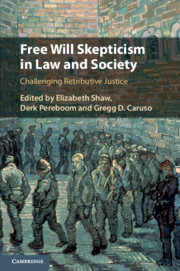Book contents
- Free Will Skepticism in Law and Society
- Free Will Skepticism in Law and Society
- Copyright page
- Contents
- Contributors
- Chapter 1 Free Will Skepticism in Law and Society: An Overview
- Part I On the Practical Implications of Free Will Skepticism
- Part II Alternatives to Retributive Punishment
- Part III Free Will Skepticism and the Criminal Justice System
- Index
- References
Chapter 1 - Free Will Skepticism in Law and Society: An Overview
Published online by Cambridge University Press: 26 August 2019
- Free Will Skepticism in Law and Society
- Free Will Skepticism in Law and Society
- Copyright page
- Contents
- Contributors
- Chapter 1 Free Will Skepticism in Law and Society: An Overview
- Part I On the Practical Implications of Free Will Skepticism
- Part II Alternatives to Retributive Punishment
- Part III Free Will Skepticism and the Criminal Justice System
- Index
- References
Summary
“Free will skepticism” refers to a family of views that all take seriously the possibility that human beings lack the control in action – i.e. the free will – required for an agent to be truly deserving of blame and praise, punishment and reward. Critics fear that adopting this view would have harmful consequences for our interpersonal relationships, society, morality, meaning, and laws. Optimistic free will skeptics, on the other hand, respond by arguing that life without free will and so-called basic desert moral responsibility would not be harmful in these ways, and might even be beneficial. In this chapter, we attempt to provide a brief sketch of the traditional free will debate, define the various positions, and frame the debate over the practical implications of free will skepticism. We focus especially on the implications of free will skepticism for the criminal law and the retributive justification of punishment.
Keywords
- Type
- Chapter
- Information
- Free Will Skepticism in Law and SocietyChallenging Retributive Justice, pp. 1 - 26Publisher: Cambridge University PressPrint publication year: 2019
References
- 3
- Cited by

